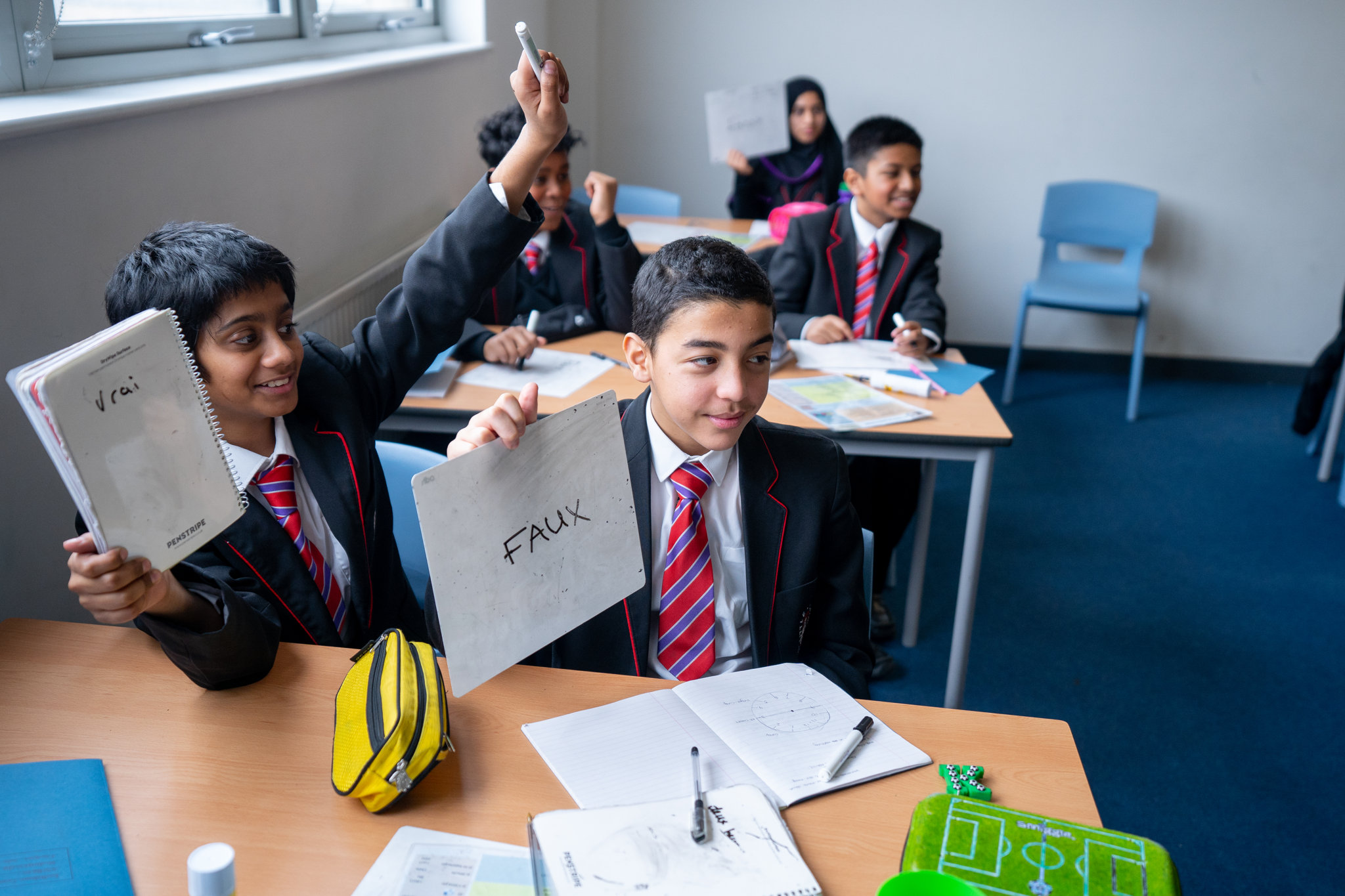Members of your department and roles (including part-time and technicians).
| Mr J. Demart | Curriculum Team Leader |
| Ms S. Adam | Assistant CTL MFL |
| Ms E. Noakes | Lead Practitioner MFL |
| Ms A. De Graaf | MFL Teacher |
| Ms A. Lebreton | MFL Teacher & Pastoral Achievement Leader |
| Ms D Laaziz | MFL Teacher |
| Ms H Saah Kenne | MFL Teacher |
| Ms P Nicolas | MFL Teacher |
| Ms R Uddin | MFL Teacher |
| Ms S Masters | MFL Teacher |
| Ms M Vaquera | SLT & MFL Teacher |
Curriculum overview and aims (KS3 and KS4):
- KS3
Curriculum content and aims
In Year 7, 8 and 9 students are exposed to vocabulary on a range of topics, related to GCSE topics. Students will develop strong basic language skills and vocabulary to give them the confidence and independence they need to continue with French or Spanish at GCSE level. Students will practise and develop speaking, writing, reading and listening skills. They will also learn about the culture of the target language countries.
Details of studies per year
Year 7 Autumn Term Topic: School
Language Focus: Giving opinions; using the verb “to have” and “to be”; present tense
Year 7 Spring Term Topic: Self and Hobbies
Language Focus: present tense; description in first and third person
Year 7 Summer Term Topic: Self; family; friends and teachers
Language Focus: present and near future tense; description in first and third person
Year 8 Autumn Term Topic: Celebrations; Food; Clothes; Activities
Language Focus: present and near future tense; use of adjectives
Year 8 Spring Term Topic: Town; Region and Country
Language Focus: present, past and near future tense; negation
Year 8 Summer Term Topic: Holidays
Language Focus: present, past and near future tense; negation; connectives
Year 9 Autumn Term Topic: Health and Wellbeing
Language Focus: present, past and near future tense; infinitive structures
Year 9 Spring Term Topic: News and Global issues
Language Focus: reflexive verbs; impersonal verbs; present, past and near future tense; infinitive structures
Year 9 Summer Term Topic: Cultural life and technology
Language Focus: Opinions and justifications; present, past and near future tense; infinitive structures
How are they assessed
In Year 7,8 and 9 students will complete summative listening, reading, writing and speaking assessments once per term. Prior to this, students receive regular feedback by teachers on listening, speaking, reading and writing.
Home learning (frequency and expectations)
Home learning is set via Google Classroom and/or Show My Homework once a week. Students should be spending 45 minutes on this homework in Y7 and 8. Students in Y9 are expected to spend 1 hour on homework.
In addition to the homework set, students should revise their vocabulary regularly. We recommend 30 minutes every 2 to 3 days.
How parents / carers can support their child
Take an interest in what your child has studied in their Spanish / French lessons and look through their book with them. Let them explain to you what they have learned. Make them learn vocabulary and question them to see how much they know from memory.
- KS4 (Y10 – 11)
Courses offered
GCSE French and Spanish
Examining Board: Edexcel
Curriculum content and aims
Students will consolidate and expand on the topics seen in year 7, 8 and 9 to develop listening, speaking, reading and writing skills in the target language. We aim to develop resilient, independent linguists who can apply the language spontaneously and confidently.
Details of studies per year
Year 10 Autumn Term 1:
My Personal World - Identity; Family; Friends; Relationships; Role Models; Mental Well-being
Year 10 Autumn Term 2:
Media and Technology/ Lifestyle and Wellbeing - Social Media and Gaming ; Sports; Music; TV and Film; Physical and Mental Wellbeing
Year 10 Spring Term 1:
Studying and My Future (School) - School; Subjects; Rules and Rights; Primary School; Trips
Year 10 Spring Term 2:
Studying and My Future (Future Plans) - My Future; Travelling; Jobs; Skills and Qualities
Year 10 Summer Term 1:
Lifestyle and Wellbeing - Food; Mental and Physical Wellbeing; Health; Improving Lifestyle; Sport
Year 10 Summer Term 2:
Consolidation and Exam Practice - All topics seen
Year 11 Autumn Term 1:
Our Planet - Environmental Issues; Natural World; Actions to Protect Environment; Green Technology
Year 11 Autumn Term 2:
My Neighbourhood - Where I live; Places in Town; Directions; Shopping; Environmental Issues
Year 11 Spring Term 1:
Travel and Tourism - Tourist Attractions; Accommodation; Transport; Places in Town
Year 11 Spring Term 2:
Consolidation and Exam Practice
Year 11 Summer Term 1:
Consolidation and Exam Practice
How are students assessed?
Students receive regular feedback by teachers on listening; speaking; reading and writing that they produce independently in class. Students are assessed termly in listening; speaking; reading and writing using assessments based on GCSE exam materials.
At the end of year 11, students will sit 4 GCSE exams, each worth 25%: Listening, Speaking, Reading and Writing.
Home learning (frequency and expectations)
Home Learning is set once a week via Google Classroom and/or Show My Homework and students should spend about 90 minutes per week completing it. In addition to this, students are expected to revise vocabulary from their books regularly. We recommend 30 minutes every 2 days to build up a wide range of vocabulary needed for GCSE.
How parents / carers can support their child
Take an interest in what your child has studied in their Spanish / French lessons and look through their book with them. Let them explain to you what they have learned. Make them learn vocabulary and question them to see how much they know from memory.
Possible careers.
Achieving a good grade in languages is essential to achieve the Ebacc performance measure. The Ebacc is now crucial for most A Level subjects and university courses.
Languages are extremely valuable for further education and university. Most top colleges and universities require students to have studied a language at GCSE to be accepted.
At university, languages can be studied jointly with most other degrees which opens many opportunities to study and work abroad and in the UK.
In the UK, many companies are suffering because they can’t find employees with good language skills. Having a GCSE or even an A level in a foreign language will increase your employability considerably in any field.
More traditional language careers include journalism, teaching, translation, international law and business.
Useful websites and apps
http://www.bbc.co.uk/schools/gcsebitesize/french/
http://www.bbc.co.uk/schools/gcsebitesize/french/
How parents or other members of other public can find out more about the curriculum / syllabus you are following.
http://qualifications.pearson.com/en/qualifications/edexcel-gcses/modern-languages-2016.html
Name of person in your department who parents can contact if they need more information about your syllabus.
Mr J Demart





.png)






.png)

.png)
.png)
.png)